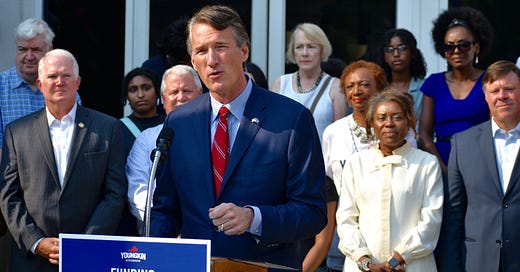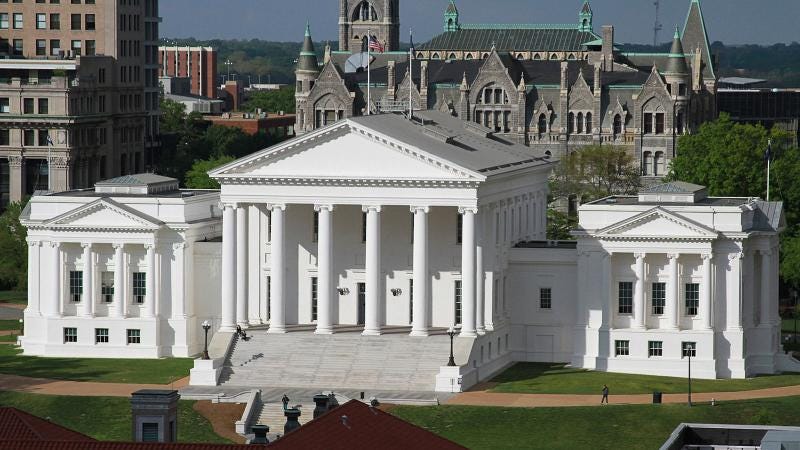Youngkin wants emergency funding to help protect HBCUs from threats
The latest in Virginia politics
This is a daily newsletter covering Virginia politics from top to bottom. Please consider becoming the ultimate political insider by supporting non-partisan, independent news and becoming a paid subscriber to this newsletter today.
The Rundown
Governor Youngkin is asking the General Assembly for emergency funding to protect HBCUs from threats
The Richmond Planet license plate could soon be at DMV, pending General Assembly approval
Lawmakers again debate allowing home-schooled students to play public school sports
More Virginia political headlines
ICYMI Yesterday: The Youngkin admin released a report on divisive concepts in school and which aspects of the public school curriculum they are removing now. Read it now.
Governor Youngkin is asking the General Assembly for emergency funding to protect HBCUs from threats
Historically Black Colleges and Universities have been the target of bomb threats across the country in 2022. Norfolk State University and Hampton University in Virginia have been among the targeted institutions that totals almost 60 nationwide.
Governor Youngkin wants the General Assembly to approve emergency funding to increase security at Virginia’s HBCUs. "I am angry and deeply concerned by the recent pattern of bomb threats plaguing our Historically Black Colleges and Universities,” Youngkin said in a statement Friday. “Next week, I will ask the General Assembly to provide emergency funding to our HBCUs for security and campus safety.”
The FBI said last week that there have not been any actual devices involved with the threats nationwide.
The governor said he spoke with the presidents of Virginia’s HBCUs about the threats they are facing.
“I am committed to harnessing state resources to support these institutions and will work together with them on a continued coordinated response that ensures the safety of our HBCU students and faculty,” Youngkin said Friday.
Lawmakers again debate allowing home-schooled students to play public school sports
By Reid Murphy, Capital News Service
RICHMOND, Va. -- The state Senate could consider a bill to allow school boards to decide if home-schooled students in Virginia can join public school sports teams.
Del. Marie March, R-Floyd, introduced House Bill 511, which advanced on a narrow 50-49 vote. Two Republicans voted against the measure and one Democrat did not vote. The legislation is also known as the “Tebow bill” for former NFL star Tim Tebow, who was home-schooled in Florida but played public school football.
March said the bill would not be a statewide mandate, but instead allow local school boards to establish a policy that would permit home-schooled students to participate in their programs.
The bill would allow fees to be charged to students to cover participation costs, as well as the costs of additional insurance, uniforms, equipment and facility upkeep and maintenance.
“This could be a way for the public schools to recoup some of the money and make some money to fund their programs,” March said. “I really am hoping if it could pass, one of my local schools in Floyd County could do the pilot program to figure out what works best, and then we can get other schools to tag along.”
Thirty-five other states passed similar legislation, according to the Texas Home School Coalition. Virginia approved a similar measure in 2017, which was vetoed by former Gov. Terry McAuliffe.
Gov. Glenn Youngkin supports the bill during a time where the state has seen a spike in homeschool education, March said. However, it is expected to face challenges in a Senate that has a slight Democratic edge, according to March. March hopes senators will see an upside for schools to gain extra funding while giving home-schooled students a chance to participate.
There are no recreational sports leagues in March’s district, she said. There are youth athletics leagues listed in Floyd County, though not for high school age students.
“We don't have another way for kids to play sports and home-school kids don't get any opportunity,” March said. “That's why it was so important to me to try and get this bill passed in my first session and help communities come together.”
Shane Riddle, director of government relations and research for the Virginia Education Association, said that someone playing public school sports should already be established in the public school community and have a familiarity with students on the same team.
“If the student is not in the community, it may be because the parents don't agree with the environment of the local schools or the public school system,” Riddle said. “But then they want the right for their child to play sports there, so that's kind of confusing in regard to the reason they pulled them out in the first place.”
The VEA opposes the bill, but Riddle said that it would be more open to changing its position if the bill were amended. Virginia High School League, the principal administrative organization of high school athletics in the state, currently requires student athletes to be full-time students in regular attendance. VEA wants home-schooled students to participate in half a day of school, Riddle said. Participation in athletics is a privilege, not a right, he said.
The VEA would be open to changing its position if the bill was written to accommodate that idea, Riddle said. But Riddle said he doesn’t believe the patrons would want to do it. He also pointed to West Virginia’s home-school law. West Virginia’s amended law requires home-schooled students to take at least one online public school course.
With members who support and oppose the bill, the Home Educators Association of Virginia remains neutral, according to Yvonne Bunn, the organization's director of support and government affairs.
“There are other sports resources, sports teams and sports leagues that play with mostly private schools, that are available for parents,” Bunn said. “We encourage parents to look into that before doing anything else.”
Home-school student athletes who wish to participate in public school sports must be under the age of 19 by Aug. 1 of the current academic year, must not receive compensation for their sport, and must comply with the disciplinary rules and school conduct guidelines applicable to all public high school athletes, including physical exams, according to the bill.
The bill was discussed Thursday in the Senate public education subcommittee but the panel has not voted on the measure.
The Richmond Planet license plate could soon be at DMV, pending General Assembly approval
By Faith Redd, Capital News Service
RICHMOND, Va. – A former Black community newspaper will be commemorated in a special license plate if Virginia House lawmakers give the bill its final stamp of approval.
Sen. Joseph D. Morrissey, D-Richmond, introduced Senate Bill 753, which will authorize the issuance of a special license plate celebrating The Richmond Planet newspaper. Lawmakers in the Senate passed the bill unanimously. The House Transportation committee unanimously approved the measure Thursday, and it will now be considered by the entire House.
The Planet was founded in 1882 by 13 formerly enslaved men, most who were Virginia public school teachers, according to the Library of Congress. A Black flexed bicep with shockwaves emanating from the arm served as the masthead design. The same symbol and the title of the newspaper will be incorporated into the license plate.
Edwin Archer Randolph, the first Black man to graduate from Yale Law School, served as The Planet’s first editor, according to the Library of Congress. Two years later, John Mitchell Jr. assumed power and led The Planet for the next 45 years. Mitchell was considered the “fighting editor” for his fight against injustice through his work.
Reginald L. Carter launched the effort to have the special plate. He was in search of a license plate for his personal vehicle, but Carter said he was uninterested with the available options. He came across the idea of creating a new plate in celebration of Black excellence. Carter described the process as “tedious but not impossible.”
Carter said he also worked on other projects in his hometown of Tappahannock. He worked to remove a Confederate statue, which the town council later voted to contextualize, and memorialize a lynched man from Essex County with a highway marker.
Mitchell’s family supports the idea.
“His great, great nephew, who's also named John Mitchell, is on the board for The Richmond Planet Foundation,” Carter said. “They’re in full support of the plate, so I couldn't have asked for a better family or representative to develop a plate after.”
The Planet covered local, national and worldwide news. It fought for all things Black– equal rights, education, voting and segregation, according to Black Virginia, a project by University of Richmond students which highlighted the newspaper’s importance. The paper also offered advice and positive news.
The Planet was bought in 1938 by The Baltimore Afro-American, according to the Library of Virginia.
Journalist Hazel Trice Edney previously worked for the Richmond Afro-American and Richmond Free Press newspapers. Edney said she conducted an independent study at Harvard University to compare the “fighting editor” styles of Mitchell and Raymond Boone, who established the Richmond Free Press in 1992. Boone was known as a “crusader of justice” and had a strong voice in the Black community.
“To have him on a license plate established in the former capital of the Confederacy and around the commonwealth of Virginia says that we do understand the fight that John Mitchell undertook,” Edney said.
The distribution and approval of the use of the new license plate is based on the ability to acquire and submit at least 450 prepaid applications, according to the bill impact statement. Carter set up an email where application and preorder inquiries were sent.
Dream for a Purpose, a marketing agency, designed the plate.
The JXN Project, an organization to preserve and explain the pivotal role of the Jackson Ward neighborhood as one of the nation’s first historically registered Black urban neighborhoods, supports Carter’s endeavor.
“We felt a responsibility to help Reggie and his campaign become the first license plate of its kind,” Sesha Moon, executive director and director of research of The JXN Project, stated in an email.
Carter worked tirelessly to collect signatures traveling throughout the state, according to Moon. He recruited Morrissey to introduce the legislation.
Mitchell’s great, great nephew, Carter and Morrissey spoke in support of the bill during the Senate hearing. Morrisey reported earlier in the month that Carter had 497 prepaid orders for the plate.
The estimated cost is expected to be just over $16,000 and will require 218 staff hours, according to the bill impact statement. Revenue from the cost of the plates—$10 for a standard plate and $20 for personalized—and future sales will cover the cost of implementation.
The plate can stay in production if 200 plates are issued within five years for the Department of Motor Vehicles to continue the issuance of plates, according to Virginia’s Legislative Information System.
“My end goal is contextualization,” Carter said. “You can’t tell American history without telling African American history, and you can’t tell Virginia's history without telling The Richmond Planet's history or John Mitchell’s history.”
More Virginia News
Youngkin’s new health commissioner sparred with state’s top epidemiologists over health guidance
League of Women Voters, other groups call for House of Delegates elections this year
House panel again blocks localities from raising sales tax on themselves for school construction
Judge Strikes Down Elite Virginia High School’s Admissions Rules
National Headlines
Ukraine’s ‘servant of the people’ Zelenskyy leads them in war
Ukraine fights to hold Kyiv amid street battles, gunfire and explosions
On a Ukrainian train, disbelief and fear as passengers flee Kyiv
Kyiv on edge: As Russian forces press in on the capital, Ukrainians are defiant
U.S. stands ready to evacuate Ukraine’s Zelensky, Russia’s ‘target No. 1’
How to avoid falling for and spreading misinformation about Ukraine
Zelenskiy says fate of Ukraine ‘being decided’ as fighting reaches streets of Kyiv






